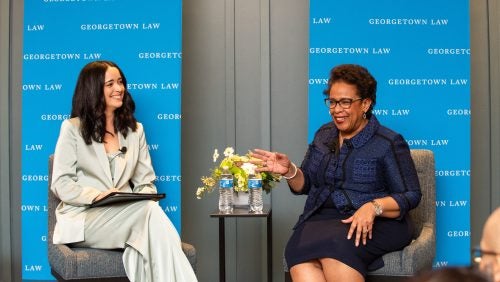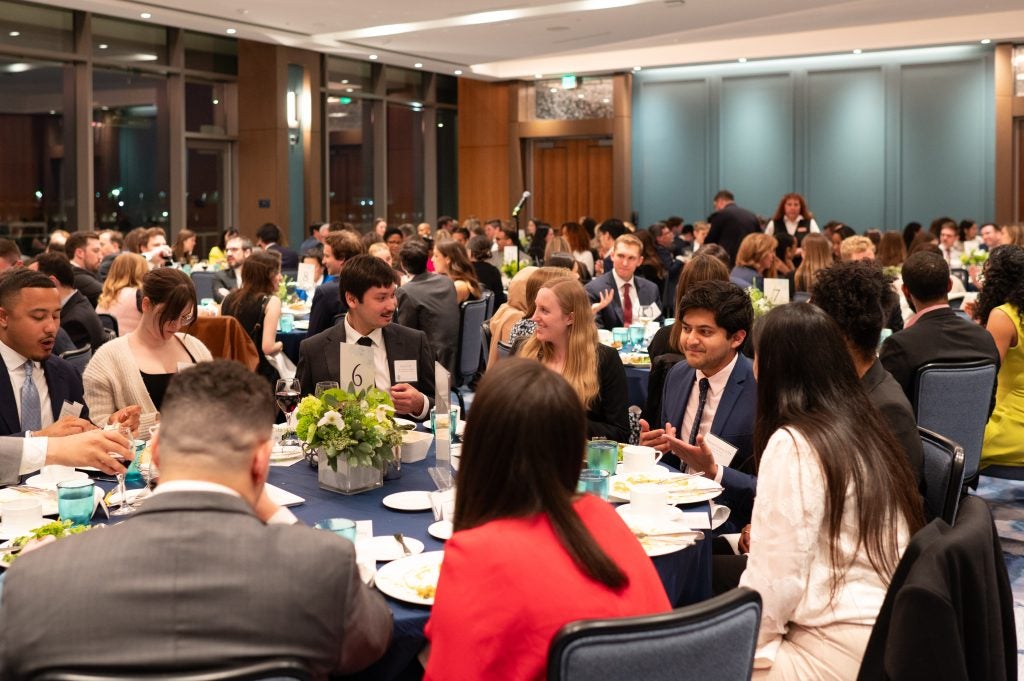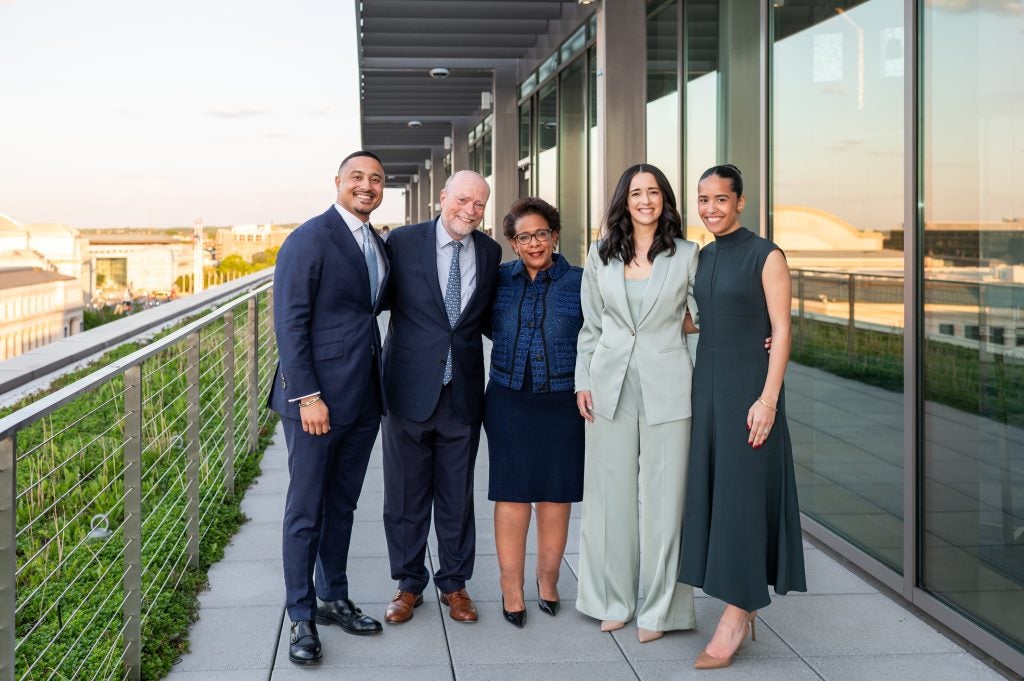Former U.S. Attorney General Loretta Lynch Addresses Georgetown Law Journal Banquet
May 2, 2024

Outgoing Georgetown Law Journal Editor-in-Chief Alexis Marvel, L'24, and former U.S. Attorney General Loretta Lynch at the 2024 Georgetown Law Journal banquet.
Former United States Attorney General Loretta Lynch called upon students, alumni and faculty to remember the power of the law to protect people and secure justice at The Georgetown Law Journal’s 11th annual alumni banquet on April 24. Living up to the ideals of justice, she said, “is our highest and best purpose as lawyers — and in my view, as citizens.”
More than 190 attendees, including current and former editorial staff representing 23 volumes of the Journal, joined the cocktail reception and celebratory dinner at the Royal Sonesta hotel across the street from the Law Center. Founded in 1912, The Georgetown Law Journal is the oldest of the Law Center’s 12 student-run law journals, with some 120 students serving on its staff each year.
During a keynote conversation with outgoing Editor-in-Chief Alexis Marvel, L’24, Lynch reflected on her career in public service — she was the first African American woman to serve as U.S. attorney general and twice served as U.S. attorney for the Eastern District of New York, having also worked as a federal prosecutor in the same office — and shared her perspective on the legal system’s role in advancing and protecting the rights of the public.
“If you want to see what a society values, look at the people that they protect with the law,” said Lynch, who held the office of attorney general from 2015 to 2017, in President Barack Obama’s administration. “There are huge swaths of people in this country who do not feel the protection of the law, but who always feel the burden of the law.”

More than 190 guests attended the cocktail reception and celebratory dinner at the Royal Sonesta Hotel.
Forging new partnerships
Marvel was joined by Dean William M. Treanor and incoming Editor-in-Chief Yasmeen Rose, L’25, in welcoming attendees and highlighting the Journal’s recent accomplishments, including the publication of student and faculty scholarship on issues such as racial biases in immigration case law and congressional funding of anti-poverty programs.
Treanor also commended the Journal for its 2023 symposium on “Afrofuturism and the Law,” the first law review conference of its kind in the United States, and offered congratulations for a new, milestone partnership between the Supreme Court Press Office and GLJ Online, the Journal’s online publication.
Starting this fall, Journal members will have the opportunity to attend Supreme Court arguments to observe oral arguments from the press box and write about them for GLJ Online. “This is truly an unprecedented opportunity, as we are the only journal in the country that can offer this opportunity to their staff,” said Rose, who is the eighth woman in a row and second Black student to lead the Journal.
In her address, Marvel underscored the role of law journals in addressing pressing legal issues. “Legal academia has the power to serve real people facing real issues and to guide the law onto a better path,” said Marvel, who will clerk on the U.S. District Court for the Southern District of New York after graduation. “As lawyers, we have the capacity to inflict great harm. But we also have the capacity to prevent it.”

L-R: Georgetown Law Journal Volume 112 Senior Development Editor Garett Eldred, L’24; Dean William M. Treanor; former U.S. Attorney General Loretta Lynch; outgoing Editor-in-Chief Alexis Marvel, L’24; incoming Editor-in-Chief Yasmeen Rose, L’25.
The pursuit of justice
The capacity of law to prevent harm was echoed by Lynch, who shared anecdotes from her upbringing in North Carolina during the keynote question-and-answer session. Early exposure to the civil rights movement through her father, a minister who aided activists participating in the 1960s sit-in movement, proved particularly formative.
“From that, I always took the lesson that ordinary people can do extraordinary things when they focus on what’s right,” she said. “Everyone can make a contribution.”
Prior to her appointment as attorney general, Lynch served as the U.S. attorney for the Eastern District of New York from 2010-2015, a position she also held during the Clinton administration from 1999-2001. Earlier in her career, she served as a line prosecutor in the same office, prosecuting cases involving narcotics, violent crimes, public corruption and civil rights. Between her government appointments, Lynch also spent periods of time in private practice. She is currently a partner at the firm Paul, Weiss.
Reflecting on her career, Lynch remarked that her experience in both private practice and public service has allowed her to serve as a “translator” between the two realms of law. She also emphasized the value of mentorship for young lawyers, recalling the support she received from the partner mentor assigned to her at her first firm, who remains a friend to this day.
When asked about her legacy as a defender of civil rights, such as the Justice Department’s work to combat voter suppression laws and protect the rights of the transgender community during her tenure, Lynch emphasized the role of lawyers and other advocates in pursuing justice on behalf of those they are called to serve.
“Justice is the people,” she said. “The people that you uplift … will never forget what it feels like to have had the Department of Justice on their side [and] to have the law on their side.”